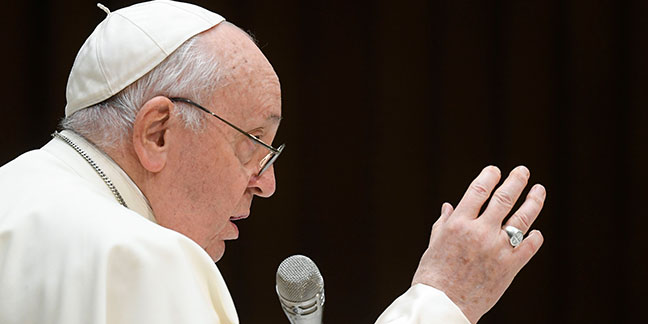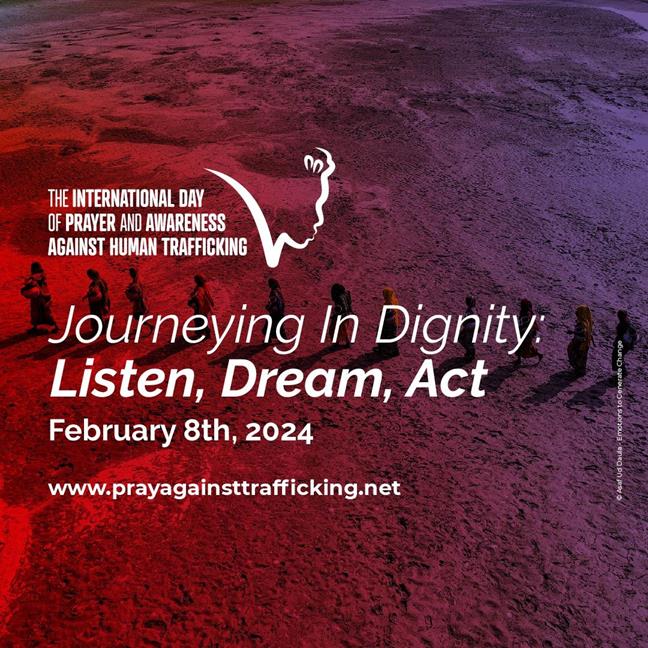 VATICAN CITY — The fight against human trafficking can be won, but it requires eliminating the root causes of the problem, Pope Francis said.
VATICAN CITY — The fight against human trafficking can be won, but it requires eliminating the root causes of the problem, Pope Francis said.
Calling for action, the pope appealed for the mobilization of "all our resources in combating trafficking and restoring full dignity to those who have been its victims," he said in a written message for International Day of Prayer and Awareness against Human Trafficking, observed Feb. 8.
"If we close our eyes and ears, if we do nothing, we will be guilty of complicity," he wrote.
The day of prayer is held on the feast of St. Josephine Bakhita, who was kidnapped by slave traders in Sudan in the late 1870s and sold into slavery before she eventually secured her freedom and became a religious sister in Italy.
"Let us remember the wrong she endured, her suffering but at the same time her strength and her journey of liberation and rebirth to a new life," the pope wrote.
"St. Bakhita encourages us to open our eyes and ears to see those who go unseen and to hear those who have no voice, to acknowledge the dignity of each person and to fight trafficking and all forms of exploitation," the pope wrote.
While trafficking often goes unseen, he thanked courageous reporters "who have brought to light modern forms of slavery."
"We know that the fight against trafficking can be won, but it is necessary to get to the root of the problem and eliminate its causes," he wrote.
St. Bakhita "stands for all those men and women who, despite their enslavement, can still attain freedom. It is a call to take action, to mobilize all our resources," he wrote.
Pope Francis praised the enthusiasm, commitment and efforts of young people. He called on individuals, families, parishes, religious communities, associations and movements to pray and promote concrete action in defense of human dignity on all levels -- political and social.
"Let us help one another to be more responsive, to open our lives and hearts to our sisters and brothers who even now are being bought and sold as slaves," he wrote. "It is never too late to take action." The International Union of Superiors General and the Union of Superiors General marked the day with an online pilgrimage of prayer and awareness at www.prayagainsttrafficking.net.
The International Union of Superiors General and the Union of Superiors General marked the day with an online pilgrimage of prayer and awareness at www.prayagainsttrafficking.net.
Cardinal Michael Czerny, prefect of the Dicastery for Promoting Integral Human Development, who was visiting South Sudan Feb. 2-9 to commemorate the first anniversary of Pope Francis' visit there, was among the special guests from dozens of countries contributing to the online prayers and reflections.
Despite human trafficking being so widespread, he said in his recorded message, "this outrageous plague tends to remain in the shadows; it is largely invisible, like its fragile and vulnerable victims."
"This is why this day of collective prayer is important, to make known and raise awareness of the phenomenon of human trafficking," he said.
It is necessary to reflect on what has been achieved so far and what next steps should be taken, he said.
Listening represents not turning "our backs on a problem even if it does not affect us directly," he said, and turning ideas and hopes into reality "requires courage and unity of purpose, caring and helping one another."
Maryknoll Sister Abby Avelino, international coordinator for Talitha Kum, which is the international network of religious orders and partners fighting against human trafficking, asked the church to pray for "everyone, survivors and perpetrators, for the transformative power of care, hope and mercy."
"Responsible behaviors, solutions, leadership" and partnerships, she said, are needed "to effectively educate the public, learn from those with lived experience and adapt new solutions to address all forms of trafficking."
— Carol Glatz, OSV News


